

The Glossary of Education Reform - Teaching Resources & Lesson Plans. Tri-County Special Education. Tri-County Special Education Skip to content PARCC Accommodations ManualPARRC Features & Accommodations Checklist nILS- New Illinois Learning Standards Math & ELA including *Social Sciences/Social Emotional/Physical Development & Health/Fine Arts/Science/Foreign LanguagesNew Early Learning & Development StandardsCommon Core & Special EducationISBE Guidance CCS and IEPs/GoalsCCS Essential Elements for Students taking Alternate Assessment/Dynamic Learning MapsCCS Essential Elements Student Baseline/Post Instruction Checklists Essential Elements ELAEssential Elements MathISBE CCS ResourcesISBE CCS Progression Tool: Search by Standard/Strand & Grade CCS Curriculum Modules.
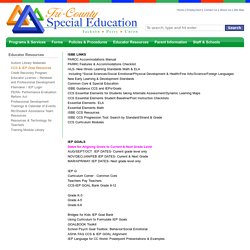
About Universal Design for Learning. Home. Response to Intervention. Special Education Programs. Special Education Director's Planning Calendar Special Education Medical Review, Requirements Beginning July 1, 2016 PDF format (6/28/16) updated Registered Nurses (RN) who do not hold ISBE Professional Educator License (PEL) endorsed as school nurse are prohibited from providing educational evaluation and instructional judgment of public school students.
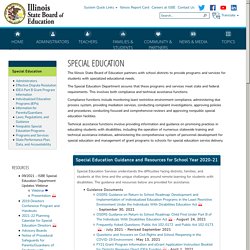
RNs who do not hold the PEL have been eligible to obtain the designation that permits them to provide such evaluation and judgment for students being evaluated for special education through a process maintained by ISBE. Since March, 2014, more than 700 Registered Nurses working in public schools have completed that process and obtained credentials as “non-PEL RN with IEP privileges PreK-21.” The Residential Treatment Work Group of the Illinois Children’s Mental Health Partnership (ICMHP) is pleased to announce that Residential Treatment for Youth with Mental Health Needs: A Guide for Parents and Guardians A 2011 memo from the U.S.
NEA Home. Teachers Teaching Exceptional Children. * Special Education Teacher - The Special Education Teacher for the middle school 6:1:2 program promotes and develops successful learning for: students who demonstrate severe interfering behaviors; students on the autism spectrum; or other behavioral disabilities.
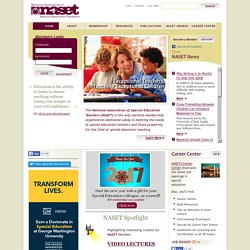
To learn more - Click here * Special Education Coordinator (K-12) - The Special Education Coordinator is passionate about supporting the students who are at-risk for academic underperformance due to emotional and/or physical challenges so that they can succeed in the school's rigorous academic program. The Special Education Coordinator holds primary responsibility for providing academic, emotional, and physical services for students who require additional support to thrive within the school's core academic program. To learn more - Click here * Special Education Teacher - We offer a competitive compensation package, including a salary significantly above the district scale and comprehensive health benefits.
The Six Ts of Effective Elementary Literacy Instruction. It seems that, finally, those who make educational policy – at the local, state, and federal levels – have begun to recognize just how much good teachers matter.
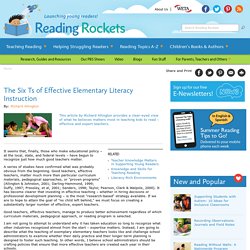
A series of studies have confirmed what was probably obvious from the beginning. Good teachers, effective teachers, matter much more than particular curriculum materials, pedagogical approaches, or "proven programs" (Allington & Johnston, 2001; Darling-Hammond, 1999; Duffy, 1997; Pressley, et al, 2001; Sanders, 1998; Taylor, Pearson, Clark & Walpole, 2000). It has become clearer that investing in effective teaching – whether in hiring decisions or professional development planning – is the most "research-based" strategy available. If we are to hope to attain the goal of "no child left behind," we must focus on creating a substantially larger number of effective, expert teachers.
We observed first and fourth-grade teachers from six states (New York, Texas, New Hampshire, California, Wisconsin, New Jersey). Time Texts Teach Talk Tasks. 6 Scaffolding Strategies to Use With Your Students. What’s the opposite of scaffolding a lesson? Saying to students, “Read this nine-page science article, write a detailed essay on the topic it explores, and turn it in by Wednesday.” Yikes! No safety net, no parachute—they’re just left to their own devices. Let’s start by agreeing that scaffolding a lesson and differentiating instruction are two different things. Scaffolding is breaking up the learning into chunks and providing a tool, or structure, with each chunk. Simply put, scaffolding is what you do first with kids. Scaffolding and differentiation do have something in common, though. So let’s get to some scaffolding strategies you may or may not have tried yet. 1.
How many of us say that we learn best by seeing something rather than hearing about it? Try a fishbowl activity, where a small group in the center is circled by the rest of the class; the group in the middle, or fishbowl, engages in an activity, modeling how it’s done for the larger group. 2. 3. 4. 5. 6. Word Finding Difficulties: Definitions & Characteristics. Definition Students challenged with Word Finding have difficulty retrieving words in the presence of good comprehension of the words that they are unable to find.
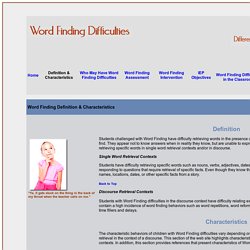
They appear not to know answers when in reality they know, but are unable to express their knowledge. These students may exhibit problems retrieving specific words in single word retrieval contexts and/or in discourse. Classroomstrategies.